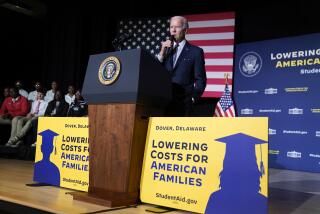Brady Debt Plan Is Making Disbelievers Out of Many Among the Debtor Nations
After the first few heady days of enthusiasm and support, the Bush Administration’s new policy for the international debt crisis--selected debt reduction, debt-equity swaps and further lending--is being looked at with growing skepticism and disappointment. Secretary of the Treasury Nicholas Brady’s “new ideas” on debt are increasingly receiving the same reaction other such gimmicks received in the past: “Where’s the beef?” Even Mexico, whose government issued perhaps the most optimistic statement, has had to backtrack and demand more substance and less conceptual framework. Other debtor governments, particularly Brazil, Argentina and Venezuela, were circumspect from the outset.
The reasons for the emerging pessimism are diverse, but can be grouped in three clusters: the time factor, who will pay and new conditionality. All three have a dampening effect on those who were looking to Washington for a truly innovative and effective stance.
The time factor is the most obvious discouraging element. For the Brady proposal to work, different federal agencies (Treasury, Federal Reserve, Comptroller of the Currency, etc.) have to reach a substantive agreement on it and not just paper over their differences. Then Congress has to be convinced, since the scheme’s key provisions are the fiscal and regulatory incentives that must be created for commercial banks to profitably write down part of their Third World loans, as well as increasing capital to the International Monetary Fund and World Bank. Then the IMF and the World Bank must be persuaded since they will have a central role, which they are apprehensive about playing. Once this is achieved, the commercial banks--the key actors--must be cajoled into writing down their loans and extending new credits. While it is not impossible for parts of this process to be hastened in emergency cases--Venezuela and Mexico--it may well take years for the plan to be fully applied to all debtors.
The second source of concern is that the proposal evidently wants to spread the costs of debt reduction but without saying so. Those who will have to pay either don’t yet know about it, or can still pretend that they don’t. Debt reduction, or exchanging old debt for new at a reduced face value, depends on several factors. Either the discount for the old paper is low or the attractiveness of the new paper is high, or the effect of the write-down is highly favorable to the creditor.
If the discount is low, say below 20%, the net effect for the debtor quickly becomes negligible, and the whole operation goes the way of last year’s Mexico-Morgan Guaranty zero-coupon bond deal. If the attractiveness of the new paper is high, this implies that somebody with an AAA rating is guaranteeing both principal and interest payments. That means either the governments of the United States or Japan, or the International Monetary Fund or the World Bank. But IMF Executive Director Michel Camdessus said in Amsterdam last week that he is not convinced that it is his organization’s role to guarantee commercial bank debt, and the World Bank doesn’t have sufficient funds to do this on a huge scale. Brady suggested IMF or World Bank guarantees precisely because he doesn’t think the U.S. government can or should guarantee the new paper. Japan may be willing to participate in such operations, but probably not on its own.
Making the exchange attractive for banks through regulatory or fiscal incentives, as a substitute for a low discount or top-quality guarantees, is possible, but would depend on Congress. Given political realities, the likelihood of the major tax breaks for banks (an indirect way of having the taxpayers foot the bill) is low. Moreover, it is difficult to see how an incentive to write down would not also become a disincentive for new lending--an indispensable part of any debt solution.
Finally, the Brady plan appears to include a heavy dose of further conditionality: Debtor countries are asked to do more in exchange for debt relief and new lending. This includes promoting swaps, which the major debtors are backing away from, citing the inflationary effects and unfair subsidies to foreign investment. But most significant, this new conditionality may well imply far more drastic cutbacks in spending and subsidies, greater privatization and trade opening and fewer restrictions still on foreign investment. Most debtor governments believe they have gone as far as they can, politically and economically, in implementing structural reforms that refuse to bear fruit.
“New ideas” are never a suitable substitute for policy. And gradual, incremental solutions to major problems often make them worse. Brady has accepted the idea of debt reduction but has not accepted its consequences or corollaries. To make a difference and allow debtor economies to grow and pay back their reduced debts, as Harvard’s Jeffrey Sachs rightly wrote last week, debt reduction is going to cost more money and political capital than the Administration has acknowledged. Either what it has in mind is simply not enough and will not make a difference, or it has not yet figured out the costs, or it is disguising them, hoping no one will notice. None of the above is an encouraging explanation.
More to Read
Sign up for Essential California
The most important California stories and recommendations in your inbox every morning.
You may occasionally receive promotional content from the Los Angeles Times.










